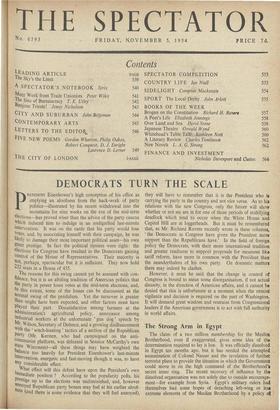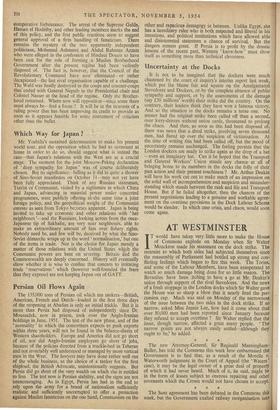The Strong Arm in Egypt
The claim of a two million membership for the Muslim Brotherhood, even if exaggerated, gives some idea of the determination required to lay it low. It was officially dissolved in Egypt ten months ago, but it has needed the attempted assassination of Colonel Nasser and the revelation of further terrorist plans to provide the situation in which the Government could move in on the high command of the Brotherhood's secret inner ring. The recent recovery of influence by the dissolved organisation was not solely due to outside encourage- ment—for example from Syria. Egypt's military rulers had themselves had some hopes of detaching left-wing or less extreme elements of the Muslim Brotherhood by a policy of comparative forbearance. The arrest of the Supreme Guide, Hassan el Hodeiby, and other leading members marks the end of this policy, and the first public reactions seem to suggest general approval of a firm handling of fanaticism. There remains the mystery of the two apparently independent politicians, Mohamed Ashmawi and Abdul Rahman Azzam who were alleged in the confession of Hindaui Doucir to have been cast for the role of forming a Muslim Brotherhood Government after the present regime had been violently disposed of. The fact is, however, that the Council. of the Revolutionary Command have now eliminated—or rather decapitated—the last rival organisation capable of a challenge. The Wafd was finally destroyed in the coups and counter-coups that endedwith General Neguib in the Presidential chair and Colonel Nasser at the head of the regime. Only the Brother- hood remained. Where now will opposition—since some there must always be—find a focus '? It will be in the interests of a ruling power that has been improving its credit to provide as soon as it appears feasible for some instrument of criticism other than the bullet.



































































 Previous page
Previous page